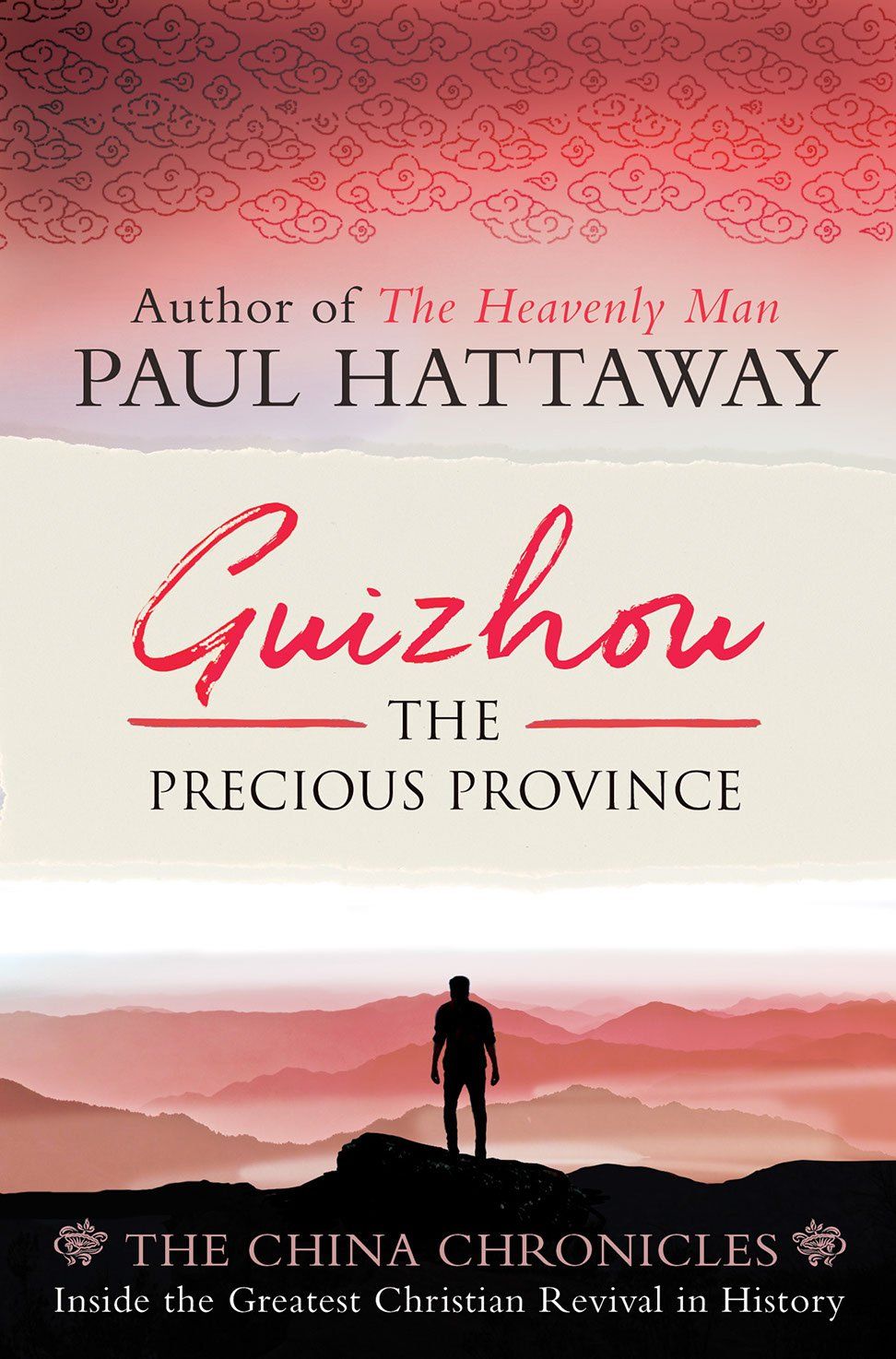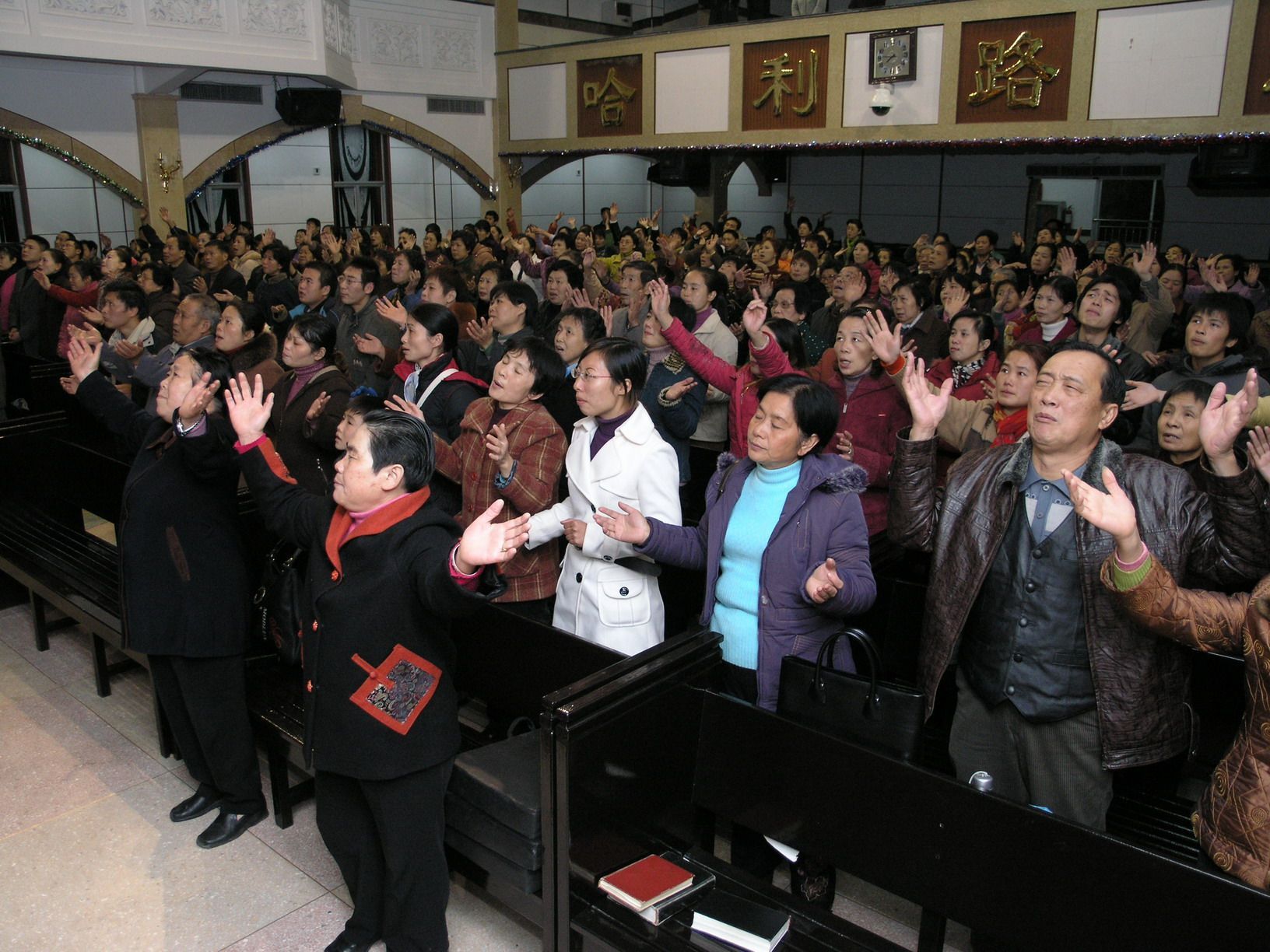The Hmu (1930s)
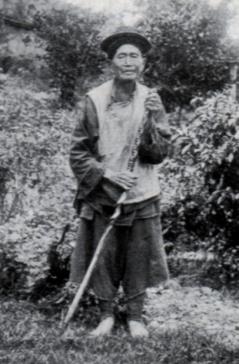
Yong Gong, an 81-year-old Hmu man who was baptized at Panghai.
Evangelical work among the multi-faceted Miao people of Guizhou was slow to commence. The first missionaries settled in the province in 1877, and although they made immediate contact with the Miao, it wasn't until 20 years later in 1897 that a base was established in their midst. At the time, Panghai was a perilous journey from the provincial capital, passing through isolated areas inhabited by leopards and wolves.
The Hmu tribe is the largest of approximately 40 Miao ethnic groups in Guizhou. The people, in their own language, go by the name Hmu, but they were commonly labelled Hei Miao ('Black Miao') by the Chinese and missionaries because of their women's dresses. The Hmu also speak their own language, distinct from other Miao varieties. After moving into the Hmu area in 1897, Ellen Webb joyfully wrote:
"We are now, by the grace of God, in the Hmu country, right among the people. The Lord Almighty opened a door, and enabled us to come in just at a time when clouds seemed to be gathering....
The Hmu here are most friendly, and come around us freely, and we have every facility for learning the language.... The people are anxious for me to wear their dress; as soon as the weather gets a little cooler I intend to put it on. The Hmu are not as inquisitive as the Chinese, and do not crowd around in the same way; they come and look and pass on. I like them very much; one feels more at ease with them than with the Chinese. Pray much for us, that we may remain here and, in God's time, that other workers may be sent, but, above all, that God will open the hearts of this people."
Pan Xiushan—the First Hmu Christian and Martyr
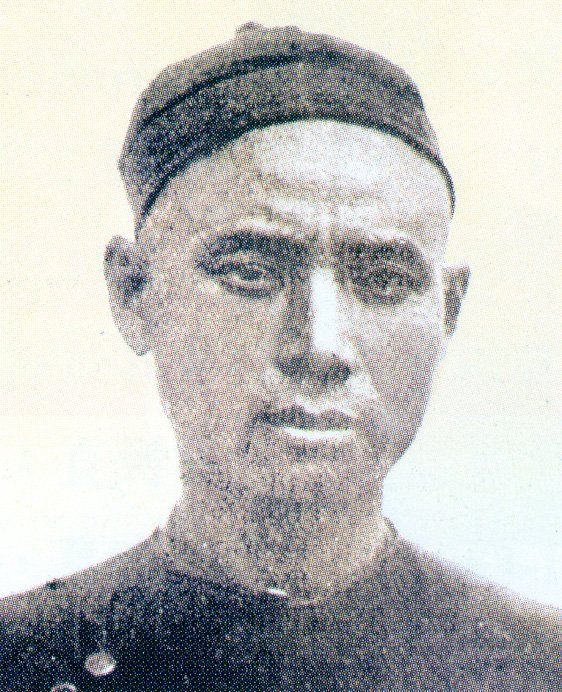
Pan Xiushan, a Hmu martyr for Christ.
Pan Xiushan, a Hmu tribesman, was born and raised in Huangping, about 93 miles (150 km) east of Guiyang. His job as a mason frequently took him to the provincial capital, where Pan and his wife believed the gospel and were baptized.
When Pan taught his Hmu language to a few of the missionaries, they were surprised to discover that the Miao languages in Guizhou differed markedly from each other. Little to nothing of the Hmu language could be understood by other Miao groups closer to Guiyang.
Reports frequently mentioned the impact that Pan's preaching had on his fellow Hmu. A letter from Samuel Clarke in August 1899 noted: "From early morning till 10:30 or 11:00 p.m. the chapel has been filled, and preaching has gone on all day. The evening service is a sight to behold; the place is packed inside, and as many people outside. Both Pan and the teacher [Henry Bolton] have preached splendidly, taking the meeting in turns. Every Sunday we have a room packed with men and children"
The murders of William Fleming and Pan Xiushan send shockwaves throughout the Hmu area. Pan was the first Hmu Christian, and the people knew that he had died unjustly, and many pondered the message he had fearlessly preached. On May 12, 1899, little more than six months after the murders, a missionary wrote:
"There are quite a few persons in Panghai and Qingping who profess to be interested in the gospel and want their names put down as enquirers. Several parties have come to Guiyang to see us. One was deputed by 40 or 50 men and another by a whole village of 30 or 40 families. Already our brother's life and labors are bearing fruit."
Over the next 18 months, a number of Hmu men and women professed faith in Jesus after understanding more of the gospel, and village leaders declared that large numbers of their people were ready to become Christians. Although many of the enquirers had no more than a basic grasp of Christian doctrine, great hopes were held that the Hmu were on the verge of a mass turning to Christ.
A Turning Point for Evil
The work among the Hmu appeared to be on the cusp of a great breakthrough in 1900, when a fierce persecution broke out against the fledgling church which shook the confidence of the Hmu. The persecution was so destructive it could be argued that Christianity has been resisted by the Hmu people as a harmful and dangerous influence to the present time.
The genesis of the persecution was born in the summer of 1900, when the Hmu grew tired of having their rice-fields raided by Han settlers. The officials did nothing to resolve the situation, so a mob of more than 200 Hmu bandits attacked the Chinese town of Kaili on the night of November 14, 1900. They set fire to more than 100 houses, killed some military and government officials, and made off with the plunder.
At daybreak the bandits stopped at the village of Sanglang, near Panghai, where they ordered the people to feed them breakfast and threatened to shoot them if they refused. Sanglang at the time contained dozens of Hmu Christian families and enquirers.
After recovering from the surprise attack, the Chinese authorities plotted their revenge. They desired to spill much Hmu blood in order to 'save face' from the humiliation. At the same time, some Hmu village headmen, sensing an opportunity to rid themselves of the hated Christians, falsely reported that the believers at Sanglang were behind the rebellion, and that the whole village had helped the bandits escape, and had even provided breakfast for them on the morning after the raid.
The magistrate at Kaili hauled the Hmu family leaders of Sanglang—both Christians and non-Christians—off to court. When the judges appeared and interrogated the men,
"The officials were completely in the hands of the Hmu headmen, who acted as both accusers and interpreters. Not one in four of the accused could understand the magistrates, nor could the magistrates understand the accused.... As a result, eight men from Sanglang, and 24 from other villages who had attended services at Panghai were put to death, some of them after they had been cruelly tortured for days in order that they might confess themselves to be rebel leaders."
When news of the massacre reached the CIM headquarters, missionary James Adam traveled from his base in Anshun to investigate the case. He reported: "These poor persecuted ones meekly marched off into the town. Days before this they had their homes looted of everything—grain, farming implements, and household utensils… As soon as they reached the Intendant's presence, eight of their number was set apart and seven of them beheaded right away; no trial or any inquiry!"
Most of the slain men were elderly village leaders who were numbered among the first Hmu Christians. A few years earlier, some of them had dug the graves to lay the bodies of the martyred Pan Xiushan and William Fleming, and now others came to dig their graves.
Still not placated, the authorities sent soldiers to 20 different villages, determined to root out all Christian influence and to leave the believers destitute by plundering their possessions. Family heads were ordered to sign a form denouncing Christianity, and were forced to pay a fine. Thirty-six families signed the forms, although they later told Adam, "They said that we recanted, but in our hearts we did no such thing. It was only the money they wanted."
Afterwards, an investigation was conducted and concluded that not a single Christian had been involved in the looting of Kaili, but it was too late for the 34 men who had been slain for crimes they didn't commit. One of the martyrs, an elderly man named Wang Jinting, was falsely accused of being a bandit. He was held for five days without food and tortured mercilessly in order to extract a confession. When he was ordered to kneel before the magistrate,
"He exhorted his son with many good words to serve God and to do his duty, and he spoke of his trust in the Lord Jesus.... His son, when at the market in Kaili, heard that some Christians were being taken out for beheading. He ran and was in time to see his dear old father led out. He could not get near to speak to him and was much afraid lest they should recognize him and kill him too. Poor lad, he wept as he related his father's sufferings."
The Hardening of the Hmu
For a time the missionaries were encouraged that the remaining Hmu believers appeared to be steadfast, but instead of the cruel martyrdoms causing the Hmu churches to flourish and grow, the persecution put a fear and resistance in the hearts of most Hmu toward Christianity. Many people were unable to reconcile the fact that God had not rescued His followers in their time of distress, and subsequent generations of Hmu have generally turned their backs on the gospel.
Fallout from the massacre continued to reverberate with negative effects among the Hmu population for decades. The long-serving Australian missionaries Maurice and Stella Hutton, who led the CIM work among the Hmu work for decades, described the cool reception they received at a village 14 years later: "Some of the men began to curse my men for leading us to their village. They did not want the foreigner nor his gospel, for some years earlier, they said, all those who had anything to do with the Gospel Hall were killed."
Even in 1937, nearly four decades after the massacre, the Huttons reported, "To this day many are afraid to have anything to do with the gospel for fear of the threats which officials still make of repeating this same treatment of Christians."
A Faithful Remnant
One reason the work among the Hmu never prospered appears to be because efforts to reach them were too thinly spread, with the handful of missionaries in eastern Guizhou not only scattering the seed of the gospel among the Hmu; but also among the Dong, Ge, Shui, Gelao, Mulao Jia, and other tribes in the region. Because of this diluted strategy, the gospel failed to find fertile soil. Few Hmu really understood the Christian message, and in most years only a few Hmu people were baptized.
Life became extremely difficult in the Hmu areas during the 1920s and 1930s, with bandits causing anarchy and much loss of life. To make matters worse, a typhoid epidemic struck in 1927, killing many people. Because of the large number of decomposing corpses in the towns, packs of hungry wolves came out of the mountains. Maurice Hutton noted the grim situation facing the Hmu Christians at the time:
"Our night meetings are very poorly attended.... Many members are sick, and others have to wait upon the sick so they cannot come. Moreover, the scare nowadays of wolves rushing down the hills into the city street and carrying off children, goats, live persons and dead bodies, keeps many people at home, for needless to say, unless people can go in companies at night they are too fearful to venture out to attend meetings."
Despite the many challenges, God preserved a small remnant of faithful Hmu disciples, and in 1927 Hutton noted, "The work is decidedly growing in the Hmu district. There is one Christian village, and if only the foreign missionaries could be permanently settled among this people I believe the work would show signs of rapid growth." The following year Hutton was encouraged by developments:
"Truly it is remarkable to see how firmly these tribal people stand, though left alone without a resident missionary for so long.... Each company of believers is carrying on their Lord's Day and weekday services. A very good feature of the work among these Hmu is that they are marrying and intermarrying between villages where gospel services are held, and so this more intimate family relationship springing up between them is resulting in constant visits being paid, and so encouraging themselves the more in their most holy faith."
One of the key figures in the Hmu Church for many years was a man named Ah So (whose Chinese name was Pan Desheng). He was the third son of a spirit priest, and Hmu tradition demanded that he be sacrificed as an infant to appease the demons. At the sacrifice, however, his body was substituted with that of a pig, and his life was spared.
After becoming a Christian, Ah So travelled extensively throughout the area, visiting hundreds of villages and distributing thousands of gospel tracts and books to interested people. Hutton described Ah So as his "right hand man" during 18 years of ministry among the Hmu.
Further progress occurred in 1930, after Maurice and Stella Hutton were finally permitted to again reside in the Hmu region after an absence of nine years. They joyfully reported:
"At first we had not a soul attending the meetings from the villages around. Prayer prevailed and now we have quite a goodly number at each Lord's Day service. At the many out-stations, the Christians carried on during the nine years without a missionary, and gradually they added to their numbers those who were saved. Before we had been back living among them for a year, the Lord gave us the joy of seeing 15 people baptized.... This, our second year back among them, the Lord has done even greater things, for already 25 men and women have been baptized, and we hope there will be a few more before this year closes.... It is the Lord's doing and we rejoice in Him and take courage for the future."
Like a seed slowly sprouting into life, a strong Body of believers appeared to be emerging among the Hmu. By 1937 Hutton summarized the influence of the mission with these words:
"Although it is a work wherein souls are saved in the ones and twos, we have three organized churches, 13 out-stations, with schools, medical dispensary, colporteurs and voluntary preaching bands of men and women.... We have even seen the devil-worshipping priests turn from devils to serve the living God, tearing down every trace of devil worship from home and heart.... Today we have Christians of the third and fourth generation of those men who, rather than give up their faith in Jesus, quietly knelt down and had their heads severed."
Scriptures for the Hmu
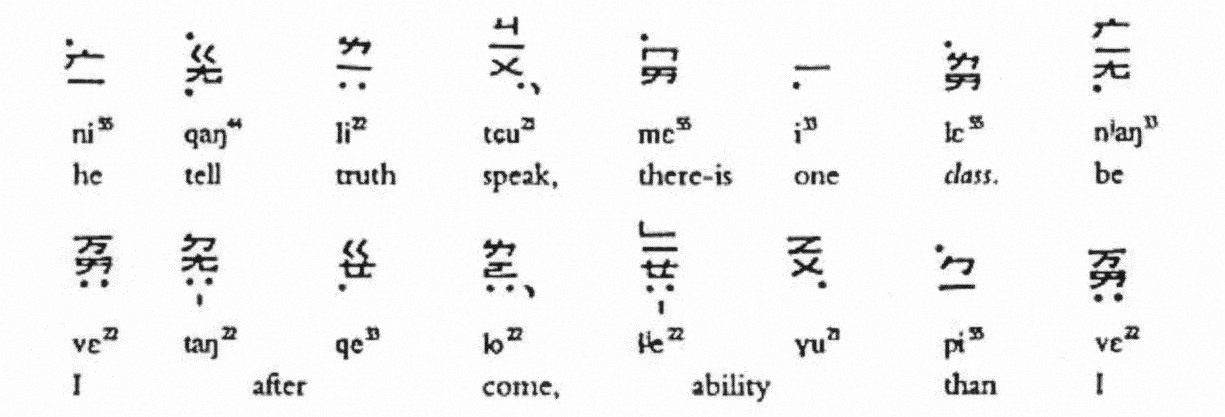
A sample of the phonetic script used for the Hmu New Testament.
Hutton also spearheaded efforts to translate the Bible into the Hmu language. There was no Hmu script, however, so the task was a complicated one. First, an orthography had to be created, and the people taught how to read it, before competent believers were chosen for the crucial translation process. Because the number of Hmu Christians was miniscule compared to the population, the challenge of finding enough people interested in reading the finished product created an added pressure.
Hutton threw himself into the translation, believing it would result in many thousands of Hmu accepting the gospel. In 1928, the first Hmu Scripture portions and a hymnal were printed, and the indefatigable Australian missionary continued to translate the New Testament one book at a time. Four years he wrote:
"The Hmu New Testament translation has claimed the greater part of my time. Though this work has proved to be most exacting, yet to see one after the other of the books of the New Testament translated into the language of the Hmu...is a joy abundant which amply repays the labor put forth.... For years it was useless almost to read from the Chinese New Testament in the services among the Hmu, for scarcely a soul understood what was being read.... Now the people in the audience repeat the message from God's Word in their very own language."
The Huttons relocated to Shandong Province to finish the translation work and to oversee the printing, but while there, they heard that many of the Hmu Christians had fallen away from the faith. They were deeply discouraged to discover that even Ah So, their faithful co-worker of 18 years, had "married a heathen wife and had gone back in his zeal. He even given up reading God's Word and prayer, and decided to leave us and the Lord's work."
The entire Hmu New Testament was finally completed in 1934, and the first books rolled off the press the following year. Unfortunately, the desire to read God's Word never gripped most Hmu people, and they continued to view Christianity as a dangerous foreign religion. Over time Hutton's translation largely fell into disuse, although in 1990 one researcher found it was still being used by a group of about 50 Hmu believers near Kaili.
The Dark Decades
After the end of the Second World War, the Huttons wanted to move back to the Hmu region and rejoin the battle, but the CIM were not in agreement, and considered the Huttons too old for the task (Maurice was in his late 50s at the time). In 1950 they were replaced by two American couples—Ivan and Mary Allbutt; and Ernie and Mertie Heimbach. With the Communists now in full control of the country, their missionary careers were short-lived. One of the final reports from the region painted a grim assessment of the state of Hmu Christianity at Panghai:
"The spiritual side of the picture is dark indeed.... Outwardly the people are friendly and seem genuinely happy to have us here. Nevertheless, in spiritual matters there is a strange aloofness. There is little real interest in the message we have come to bring, and they seem to find it a tremendous task to understand the barest essentials of the gospel....
Of the Christians who at one time were attached to the church there only remains three or four who in any outward way confess His Name. Even they are miserably weak and stand in need of reviving grace. A few others are back in the thralls of demonology and sin. They give no evidence of ever having had life, although they used to attend when former missionaries were here. There is no Christian here to whom we can look for companionship and help in the work....
Praise God, some of the Hmu church leaders from other centers have been to visit us recently and they are a tremendous encouragement. We had blessed prayer fellowship with them and it was with rejoicing that we saw them standing firm on the Rock with faith and courage. I pray the Lord might raise up men of their calibre here in Panghai itself."
The Heimbachs were expelled from Panghai in February 1951, just three months after commencing their missionary calling. The Allbutts were also arrested and removed from China by the Communist regime, and a dark curtain was drawn on the long yet largely fruitless work among the Hmu.
Tellingly, in his final communication before being expelled, Ivan Allbutt wrote a summary of the more than 50 years of efforts to penetrate the Hmu with the gospel. He referenced the massacres of Hmu Christians in 1900, and how "three generations later, it is still a hindrance to the preaching of the gospel among this tribe." He sadly concluded:
"In a tribe conservatively estimated to include 500,000 people, there are about 100 who have confessed the Lord in baptism, with perhaps that many more who have made some sign of interest in Christian things. One hundred among half a million.
There has been no resident missionary among this tribe at all, for any length of time, since 1934. They have the New Testament in their language, but are still waiting for some missionaries to teach them how to use it."
The Hmu Today
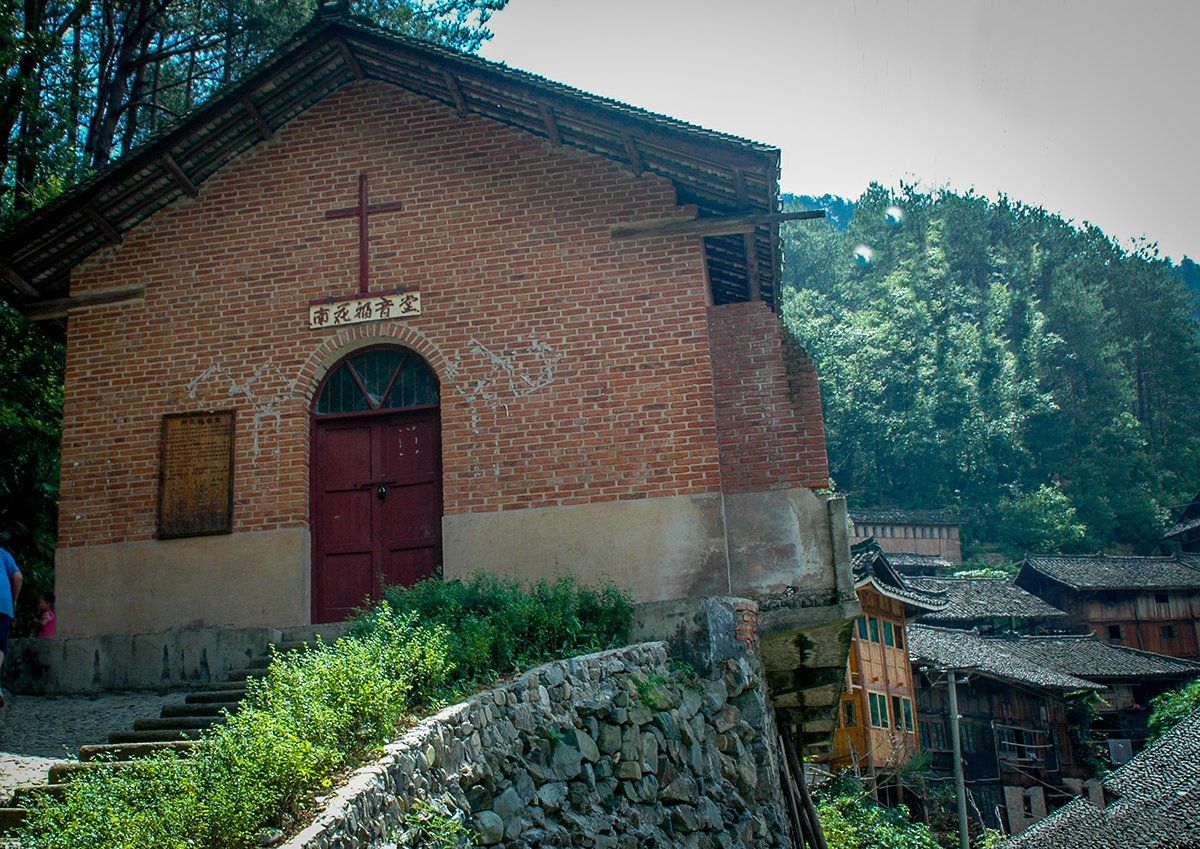
A Hmu church near Kaili. A handful of elderly believers in this congregation still read the
Scriptures translated by Maurice Hutton in 1934. [Miao Messenger]
Today, more than a century has passed since the massacre of Hmu Christians, but the people have never been able to fully shrug off those wicked events, and the Hmu remain one of the largest unreached people groups in China. One contemporary source estimates that only about 7,000 (or less than one-half of one percent) of the three million Hmu people are Christians today.
Though the Hmu Christians are not large in number, they have continued to hold on to their faith in Jesus, even as the flame has flickered very dimly at times.
The last few decades have witnessed a dramatic shift in the demographics of the Hmu. Hundreds of villages in eastern Guizhou have been depopulated, some almost completely, as people of working age flee the poverty and lack of opportunities and migrate to the large cities in search of work. Many do not return except on special occasions like the Chinese New Year. Consequently, many Hmu villages today consist of elderly people taking care of their grandchildren, while all the men and women of working age are absent.
May God's people everywhere cry out in fervent prayer for the salvation of the gentle yet traumatized Hmu people of Guizhou. May the living God have mercy on them, and complete the wonderful plan He had begun to implement before Satan and wicked men intervened to shut the hearts of generations of Hmu to the claims of the gospel.
© This article is an extract from Paul Hattaway's book 'Guizhou: The Precious Province'. You can order this or any of The China Chronicles books and e-books from our online bookstore.

